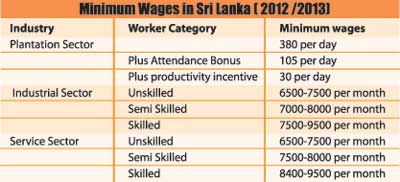Reply To:
Name - Reply Comment
.jpg) As the current two-year collective agreement lapses this month, negotiations for another wage increase in the plantation sector are expected to begin soon.
As the current two-year collective agreement lapses this month, negotiations for another wage increase in the plantation sector are expected to begin soon.
Profitability and productivity of an industry always become key issues whenever worker wages are discussed, inflation takes a back seat and the plantation industry is no exception.
It appears that at the last collective agreement, workers' wages were increased by 30 percent, resulting in a monthly take home pay for example of a tea plucker becoming Rs.13,390/=. The minimum wages set at national level in the year 2012 and continued in 2013 are given in Table 1.
Workers, whether in urban areas or estates, are equally affected by the rising cost of living. Besides, the absence of many unquantifiable benefits the workers in urban areas enjoy is a de-incentive for estate youth to work in estates.
Both tea and rubber are enjoying a buoyant market now although production is an issue. Tea and rubber prices are at attractive levels and profits up by 45 to 50 percent in rubber.
In this background, it may be useful to re-examine the concept of ‘Performance-linked wages’, as numerous debates are likely to emerge around this concept when the wage issue is discussed. However, this concept was discussed two years ago when the last wage increase negotiations were on.
Performance based
Performance-related wages are wages paid to someone relating to how well one works. Car salesmen, production line workers, for example, may be paid in this way or through commission.
Business theorists- Professor Yasser and Dr Wasi- were great supporters of this method of payment, which is often referred to as PRP. They believed that money was the main incentive for increased productivity and introducing the widely used concept of 'piece work'.
This standards-based system is used for evaluating employees and setting salaries by many employers. Standards-based methods have been in de facto use for centuries among commission-based sales staff: They are paid more for selling more and low performers do not earn enough to make keeping the job worthwhile, even if they manage to keep the job.
In addition to motivating the rewarded behaviour, standards-based methods can provide a level of standardization in employee evaluations, which can reduce fears of favouritism and make the employer's expectations clear. For example, an employer might set a minimum standard of unachievable task, and reassign or replace employees who cannot perform at that level.
Employees would be secure in knowing that their performance was evaluated objectively, according to the standard of their work, instead of the whims of a supervisor or against an ever-climbing average of their group.

Criticism
A fundamental criticism of performance-related pay is that the performance of a complex job as a whole is reduced to a simple, often single measure of performance.
As a simple measure, this gives no regard to the quality of work, for instance, whether the target was achieved or whether the employer emerged satisfied. Performance-related pay may also cause a hostile work attitude. Many employees may compete for the attentions of a single manager.
Where an employer has been helped by more than one employee, further resentment may be caused if the incentive is taken by whoever happens to make the final stages of the target. Macroscopic factors such as an economic downturn may also make employees appear to be performing to a lower standard independent of actual performance.
Performance-based systems have met some opposition as they are being adopted by corporations and governments. In some cases, opposition is motivated by specific ill-conceived standards, such as one which makes employees work at unsafe speeds, or a system which does not take all factors properly into account.
In other cases, opposition is motivated by a dislike of the consequences. For example, a company may have had a compensation system which paid employees strictly according to their seniority. They may change to a system that pays workers according to how much they achieve. Low-performing senior employees would object to having their income cut to match their performance level, while a high-performing new employee might prefer the new arrangement.
Research
Academic evidence has increasingly mounted indicating that performance-related pay leads to the opposite of the desired outcomes when it is applied to any work involving cognitive rather than physical skill. Research has repeatedly demonstrated that as long as the tasks being undertaken are purely physical, performance-related pay works as expected. However, once rudimentary cognitive skills are required, it actually leads to poorer performance.
Cultural
An international study pointed out that cultural differences affect the kind of reward systems that are in use. According to the study, there is a connection among;
 Initially, tea pluckers were paid a fixed daily wage plus a cost-of-living allowance (revised every quarter, based on published index numbers). In return, they had to harvest a minimum quantity of green leaf per day. For any excess quantity harvested above the norm, they were paid a plucking incentive.
Initially, tea pluckers were paid a fixed daily wage plus a cost-of-living allowance (revised every quarter, based on published index numbers). In return, they had to harvest a minimum quantity of green leaf per day. For any excess quantity harvested above the norm, they were paid a plucking incentive.